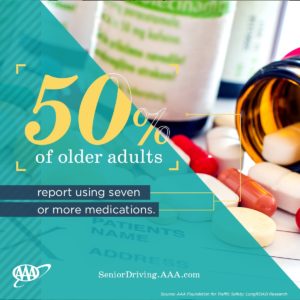COLORADO SPRINGS – It is not just illegal drugs that are a danger on the roads, some medications can increase crash risk by 300 percent.
“If you’re taking new medication, anti-depressants, anxiety medications, pain medications, those can combine and have a synergistic effect that can make you more confused or less sharp and reactive,” said Dr. Sam Skaikh at UCHealth Memorial.
New research from AAA found that 50 percent of older drivers report using seven or more medications a day.

The problem is that nearly 20 percent of those drivers use medications that can increase their crash risk. Some of those medications, including benzodiazepines and first-generation antihistamines, are known to have side effects that can impair your driving, such as blurred vision, confusion, fatigue or affect your coordination.
“Our research show that the more medications an older driver takes, the more likely they are to use a medication that can get them into a crash,” said Skyler McKinley, spokesperson, AAA Colorado.
According to AAA, a record 42 million adults ages 65 and older are driving on America’s roads, making them the largest driving population, and that number is only expected to grow.
“We know two things for certain: There is a growing number of older drivers, and more and more of them use multiple medications without realizing the impact their prescriptions can have on their driving,” McKinley said.
To stay safe on the roads, AAA says older adults and their families need to get a better understanding of the prescriptions they are taking and their side effects.

Drivers should sit down with their doctors and bring a list of all medications that they are taking, that includes prescriptions, over the counter medications, vitamins and supplements. Also ask questions about your drugs, including side effects or interactions that could affect your driving. Also ask about possible alternatives, that includes medications, changing the doses or changing the timing of doses to avoid conflicts with driving.
“Don’t be afraid to question healthcare providers,” McKinley said. “It’s their job to help you. And the answers may just save your life.”
AAA has more information about the effects of medications online at at RoadWiseRX.com. The full AAA report can be found here.

